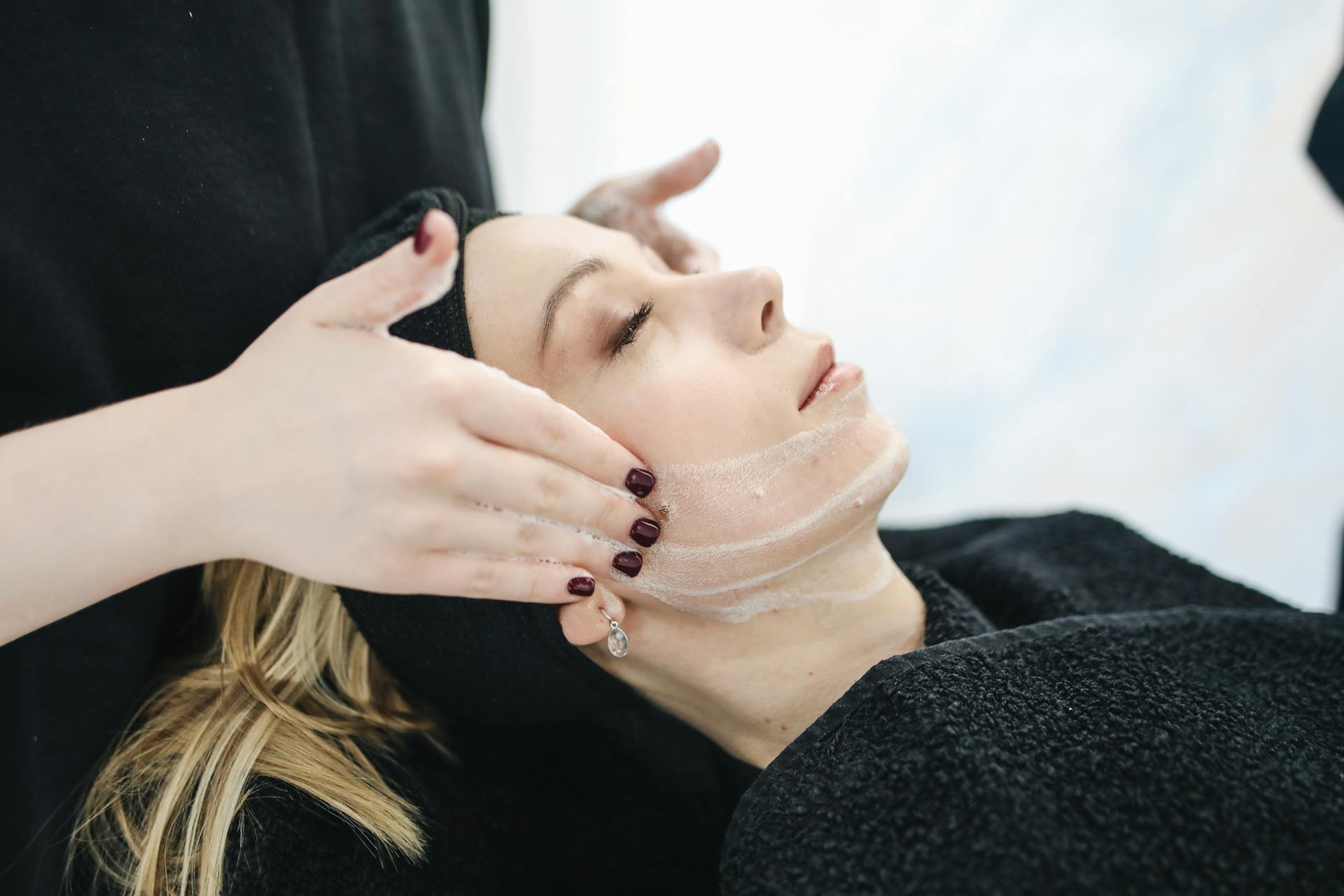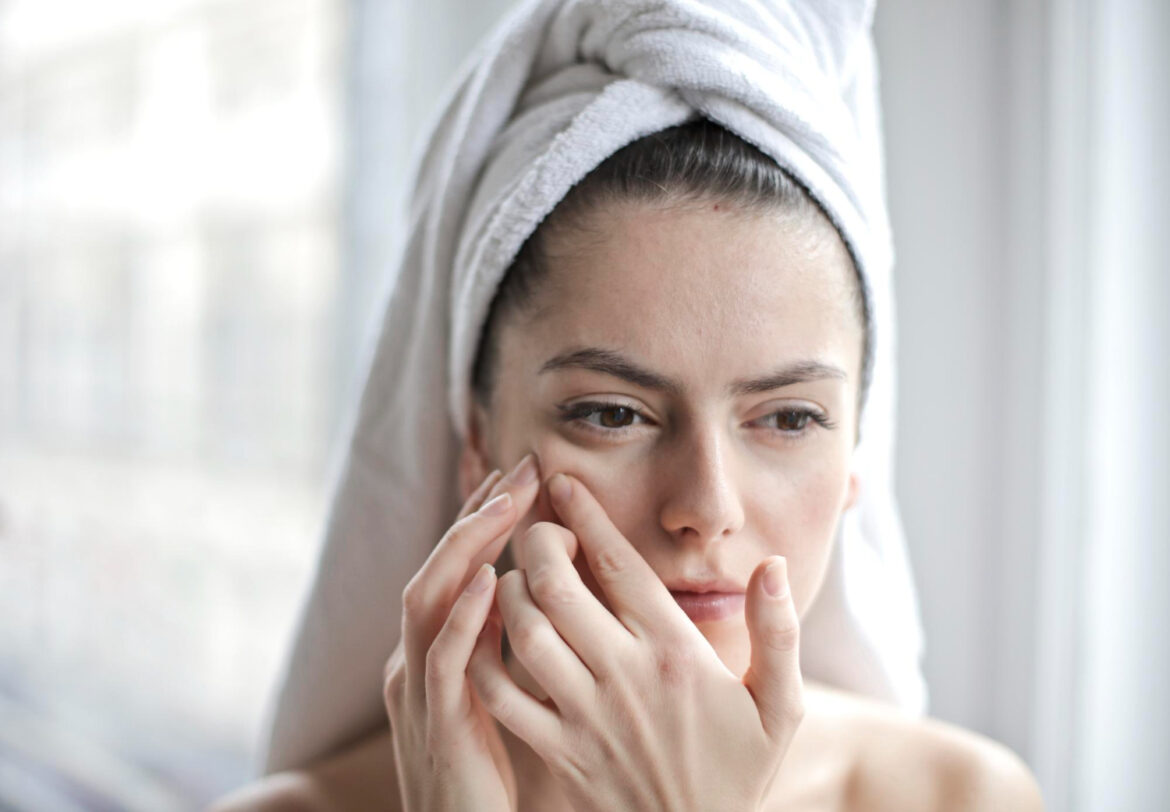Dehydrated skin can feel tight, rough, and uncomfortable. It’s different from dry skin, as dehydration means your skin is lacking water, not oil. Fortunately, with the right skincare routine, you can rehydrate your skin and bring back its natural glow. This guide covers the best skincare routine for dehydrated skin, product recommendations, and additional tips to keep your skin healthy and hydrated.
Table of Contents
ToggleWhat is Dehydrated Skin?
Dehydrated vs. Dry Skin: What’s the Difference?
While they sound similar, dry and dehydrated skin are not the same. Dry skin lacks natural oils due to fewer oil-producing glands. Dehydrated skin, however, lacks water, which means even oily skin can be dehydrated. Dehydration can lead to dullness, tightness, and increased sensitivity.

For a deeper look into the differences, visit Healthline’s guide on dehydrated skin.
Common Signs of Dehydrated Skin
- Tightness or discomfort
- Dull, lackluster appearance
- Fine lines or wrinkles that appear more prominent
- Dark under-eye circles
- Skin feels sensitive or irritated
Why Does Skin Become Dehydrated?
Factors Contributing to Skin Dehydration
Dehydrated skin can be caused by a variety of internal and external factors:
- Climate: Cold, windy, or hot weather can draw moisture out of your skin.
- Lifestyle Choices: Not drinking enough water, excessive caffeine or alcohol consumption, and smoking can all lead to dehydration.
- Skincare Products: Using harsh cleansers, over-exfoliating, or not moisturizing properly can disrupt the skin barrier and result in water loss.
- Diet: Eating too few fruits and vegetables can reduce the amount of water your body absorbs.
For more on what causes dehydrated skin, read Verywell Health’s article on dehydrated skin.
The Ultimate Skincare Routine for Dehydrated Skin
Here’s a step-by-step skincare routine specifically tailored for dehydrated skin to help restore moisture and maintain a healthy glow.
Also Read: Pre-Workout Skincare Routine: A Guide to Glowing Skin
1. Gentle Cleanser
- Purpose: Removes dirt and impurities without stripping natural oils. Look for non-foaming, hydrating cleansers.
- How to Use: Use twice daily—morning and night. Avoid hot water, as it can further dehydrate the skin.
- Recommended Product: CeraVe Hydrating Cleanser, which contains ceramides and hyaluronic acid to retain moisture.

Find more on gentle cleansers at Allure’s cleanser guide.
2. Alcohol-Free Toner
- Purpose: Balances your skin’s pH and adds a layer of hydration. Choose a toner with ingredients like glycerin or rose water.
- How to Use: Apply after cleansing with a cotton pad or your hands. Pat gently to avoid irritation.
- Recommended Product: Thayers Alcohol-Free Rose Petal Witch Hazel Toner, known for its gentle, hydrating properties.
For more on the benefits of alcohol-free toners, visit Byrdie’s toner guide.
3. Hydrating Serum
- Purpose: Delivers deep hydration to the skin. Look for serums with hyaluronic acid, glycerin, or panthenol.
- How to Use: Apply a few drops to slightly damp skin after toning, morning and night.
- Recommended Product: The Ordinary Hyaluronic Acid 2% + B5, which helps to attract and retain moisture in the skin.
Learn about more hydrating serums at Healthline’s best serum guide.
4. Moisturizer
- Purpose: Locks in hydration and restores the skin barrier. For dehydrated skin, opt for a lightweight moisturizer during the day and a richer one at night.
- How to Use: Use after your serum, twice daily. Apply generously at night for extra hydration.
- Recommended Product: Neutrogena Hydro Boost Gel-Cream, a water-based moisturizer that hydrates without feeling heavy.

Check out more recommendations on Allure’s best moisturizers list.
5. Broad-Spectrum Sunscreen (Morning Only)
- Purpose: Protects your skin from UV damage, which can exacerbate dehydration. Always opt for SPF 30 or higher.
- How to Use: Apply every morning as the final step of your routine, even on cloudy days.
- Recommended Product: La Roche-Posay Anthelios Melt-in Milk Sunscreen SPF 60, ideal for sensitive and dehydrated skin.
For sunscreen recommendations, visit SkinCancer.org’s guide to sunscreen.
6. Face Oil (Night Only, Optional)
- Purpose: Seals in moisture and provides an extra layer of hydration. Oils like squalane and jojoba are particularly beneficial for dehydrated skin.
- How to Use: After moisturizer, apply a few drops of oil to your face. It helps lock in all the products underneath.
- Recommended Product: The Ordinary 100% Plant-Derived Squalane, lightweight and deeply hydrating.
Also Read: 5 Reasons Your Skincare Stopped Working and 5 Alternatives to Try
Additional Tips for Managing Dehydrated Skin
1. Stay Hydrated
Drinking plenty of water is essential for rehydrating your skin from within. Aim for at least 8 glasses of water a day.
2. Use a Humidifier
Using a humidifier in your home can add moisture to the air, helping to keep your skin hydrated, especially in dry climates or during winter.
3. Limit Alcohol and Caffeine
Both alcohol and caffeine can dehydrate your body and skin. Try to limit your intake and balance it with extra water.
4. Avoid Over-Exfoliating
Over-exfoliating can strip your skin’s natural moisture barrier, leading to dehydration. Limit exfoliation to once a week and use gentle products.
Also Read: 7 Ways to Prevent Wrinkles for a Youthful Glow
5. Incorporate Hydrating Face Masks
Consider using hydrating masks once or twice a week to give your skin a moisture boost.
For more skincare tips, visit Self’s winter skincare guide.
Choosing the Right Products for Dehydrated Skin
Key Ingredients to Look For:
- Hyaluronic Acid: Can hold 1,000 times its weight in water, making it perfect for hydrating skin.
- Glycerin: A humectant that attracts moisture from the air to your skin.
- Aloe Vera: Known for its soothing and hydrating properties.
Ingredients to Avoid:
- Alcohol: Can strip the skin of its natural moisture.
- Fragrances: Often irritate sensitive, dehydrated skin.
- Sulfates: Found in cleansers, these can dehydrate skin by removing natural oils.
For more on skincare ingredients, check out Paula’s Choice Ingredient Dictionary.
Common Skincare Mistakes with Dehydrated Skin
1. Skipping Moisturizer
Even if your skin feels oily, skipping moisturizer can worsen dehydration. Use lightweight, non-greasy formulas.
2. Using Harsh Products
Products with alcohol, fragrances, or sulfates can damage the skin barrier and increase water loss. Stick to gentle, hydrating options.
3. Hot Showers
Hot water strips away the skin’s natural oils, leading to more dehydration. Opt for lukewarm showers instead.
For more skincare mistakes, check out Dermstore’s top skincare mistakes article.
DIY Hydrating Masks for Dehydrated Skin
1. Cucumber and Aloe Vera Mask
- Ingredients: 1/2 cucumber, 2 tbsp aloe vera gel.
- How to Use: Blend cucumber and mix with aloe vera. Apply to your face for 15-20 minutes, then rinse.
- Benefits: Cucumber cools and hydrates, while aloe vera soothes and moisturizes.
2. Banana and Honey Mask
- Ingredients: 1/2 ripe banana, 1 tbsp honey.
- How to Use: Mash the banana and mix with honey. Apply and leave for 15 minutes before rinsing.
- Benefits: Bananas are rich in potassium, helping to moisturize, while honey locks in hydration.
For more DIY mask recipes, visit Byrdie’s face mask ideas.
Conclusion: The Path to Hydrated Skin
Achieving and maintaining hydrated skin is possible with the right routine, products, and a few lifestyle changes. Consistently follow this skincare routine, choose gentle, hydrating products, and stay hydrated throughout the day for the best results.
For additional product recommendations and skincare advice, explore resources like Dermstore and Allure.
Taking care of dehydrated skin is a journey, but with the right steps, you can restore your skin’s natural glow and keep it feeling soft and comfortable. Enjoy your path to hydrated, happy skin!
FAQ: Best Skincare Routine for Dehydrated Skin
1. What is dehydrated skin, and how is it different from dry skin?
Dehydrated skin lacks water, whereas dry skin lacks oil. Dehydrated skin can feel tight, dull, and more prone to fine lines, but it can affect anyone, even those with oily skin. In contrast, dry skin is a skin type where there’s a lack of natural oils, often causing flaky or rough texture. Dehydration is a temporary condition that can be fixed with proper hydration and skincare, while dry skin is a permanent type that needs consistent moisturizing.
2. How can I tell if my skin is dehydrated?
Signs of dehydrated skin include tightness, dullness, fine lines, and increased sensitivity. You might also notice dark circles or puffiness around the eyes. A quick way to test is to pinch a small area of your skin on your cheek—if it wrinkles with gentle pressure, it may be dehydrated.
3. Can dehydrated skin affect people with oily skin?
Yes, dehydrated skin can affect anyone, regardless of skin type. In fact, dehydrated skin can sometimes lead to an overproduction of oil as your skin tries to compensate for the lack of moisture. This can create a combination of oily and dehydrated skin, which might be confusing to manage, but using hydrating and non-stripping products can help balance it.
4. What ingredients should I look for in products for dehydrated skin?
Look for ingredients like hyaluronic acid, glycerin, aloe vera, and ceramides. Hyaluronic acid and glycerin are humectants that draw moisture into the skin, while aloe vera soothes and hydrates. Ceramides help restore the skin barrier, preventing water loss and keeping your skin protected.
5. Are there any ingredients I should avoid with dehydrated skin?
Yes, avoid alcohol-based products, sulfates, and fragrances, as they can strip moisture from the skin and disrupt its natural barrier. Harsh exfoliants should also be used sparingly, as they can worsen dehydration by damaging the outer layer of the skin and increasing water loss.
6. How often should I moisturize dehydrated skin?
Moisturize your skin twice a day—morning and night. During the day, use a lightweight, hydrating moisturizer to keep your skin feeling fresh and comfortable. At night, opt for a richer, more nourishing cream to repair and hydrate while you sleep. Adding a face oil at night can further lock in moisture.
7. Is it necessary to use a hydrating serum in my routine?
A hydrating serum can be very beneficial for dehydrated skin, as it delivers moisture deep into the skin. Serums with hyaluronic acid are especially effective for adding hydration. Apply your serum after toning and before moisturizing for maximum benefits.
8. How can I prevent my skin from becoming dehydrated again?
To prevent dehydration, stay hydrated by drinking plenty of water, avoid overusing drying skincare products, and use a humidifier, especially in dry climates or during winter. Limit your intake of caffeine and alcohol, which can dehydrate the skin, and avoid hot showers that can strip your skin of moisture.
9. What role does diet play in skin hydration?
Diet can significantly impact skin hydration. Eating water-rich foods like cucumbers, watermelon, and oranges can help keep your body and skin hydrated. Additionally, consuming omega-3-rich foods, such as salmon and flaxseeds, can strengthen your skin barrier and help retain moisture. Try to include plenty of fruits, vegetables, and healthy fats in your diet to support overall skin health.
10. How long does it take to see improvements in dehydrated skin with a proper skincare routine?
Improvement can be seen within a few days to a couple of weeks, depending on the severity of the dehydration and your consistency with the routine. With regular use of hydrating products and a healthy lifestyle, you should start noticing your skin feeling more comfortable and looking more radiant. For lasting results, maintaining a consistent skincare routine is essential.
